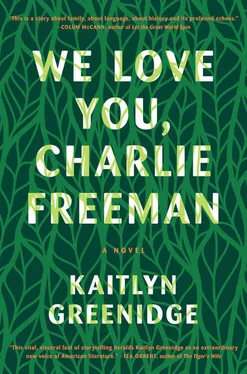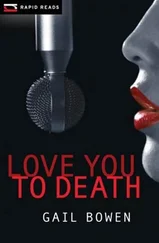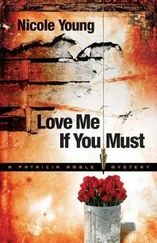She didn’t want the divorce and neither did he, not really, not deep down. But she’d left him no choice. She’d shown herself to be the worst of what anyone could think of her, and not just in front of him; they could have recovered, maybe, if he’d been the only one to see her shame. But in front of Dr. Paulsen and that boy Max, and his baby girls, and most of all, in front of his brother Lyle, sneering Lyle, who saw the worst and more, who was proven right after all those years: “That woman is going to ruin you, Charles.”
The night of Thanksgiving, the two of them had sat in silence in the living room, after the girls and Charlie were asleep. They’d sat and she kept her head bent low. She’d never bent her head like that before. He’d studied the bend of Laurel’s head and then that dumb boy Max had burst into the apartment, used his staff key to open the door. He’d forgotten his video camera, he’d come back, and when he saw them, Max’s face flushed with pity, he apologized profusely, he shut the door and turned his own key in their lock, and that had decided it.
Charles said, “I don’t think I can live here anymore.”
And Laurel had kept her head down so that he couldn’t see her cry. She spared him that, in the end, she was kind about that. Her voice was low and strangled, “What do you want to do?”
And now, months later, he knew the answer to that question. He wanted to talk to a crowd about something that he loved. It was a pressing need. He felt it keener than the systematic breakdown of his very body without Laurel. He found, in the months since they split, that he was now embarrassingly earnest. He’d been good at being honest about his feelings before. He wasn’t like Lyle, who once told him he only said “I love you” to Ginny on Christmas, and even then, only every other year. No, Charles always prided himself on his effusiveness with the girls. Speaking his feelings was not the problem. It was that when he did it now, it came out deadly serious. He had always prided himself on his humor. This was a list of what he was: a good husband, a good father, a good teacher, and a funny guy. But lately, he was sick of jokes. He was sick of joviality. He only wanted to talk about things that he loved.
In the teachers’ lounge, he frightened people. A simple “See the game last night?” set him off. He would discourse on the beauty of a spiral throw, on the intensity of a team’s surge. Once he even rhapsodized on the splendor of the Celtics’ colors. He knew, even as he was speaking, that his ardor was horrifying. He saw it on the faces of his listeners, how some would widen their eyes and some would narrow and all would eventually turn away, hoping this would get him to stop talking. It didn’t. He talked even more. He wanted, he desperately needed, to speak about all the things he loved, to remind himself they still existed in the world, that the things he loved were multitudes, that not everything he loved was locked away from him in the Toneybee Institute.
The first bell rang and he watched the shadows of the trees on the back wall again. He supposed, if he had to talk about something he loved, he could talk about that. How much he loved the green and how much the green was like Laurel.
He stood up and began writing on the board. The secret of teaching was to set up an ever more elaborate series of scenes. They liked it. They loved it when they found you still writing on the board. It was like getting a glimpse of an actor in a dressing room, putting on his makeup before the show. It gave the whole endeavor a frisson of excitement.
On the dull, ashy blackboard he drew a honeycomb. The simplest tessellation. Last period was his favorite because, he was ashamed to admit it, his most devoted students were here. He never understood this waxing adoration. Back in Boston, some years, none of them liked him; many years they outright despised him. But then, sometimes, he would get a group of students like these, who laughed at his jokes, who stayed after class, who seemed to love him. At Courtland County High, it was four boys in the last period on Tuesday, who breathlessly christened him their favorite teacher at the beginning of the year. They were all freshmen and all players on the school soccer team, and they seemed to have adopted him, his jokes, and his class as their own personal mascot. There was Nick and Adam and Seth: all awkward bones and muddy knees. Sometimes he caught a smell off of them, the smell of the terrible loneliness of male adolescence, and it made him want to cry. It smelled like tears. He’d smelled the exact same thing on the boys he taught back in Boston, that same strangled melancholy.
The fourth boy in his fan club was Hakim. Hakim was one of the three black boys in the whole freshman class, bused in, like his comrades, from Spring City. Charles asked Charlotte about Hakim at the start of the year, but she’d bristled at his name, turned up her nose. “He’s all right, I guess,” she’d huffed. From that reaction, he’d gathered that Hakim, despite his athletic abilities, wasn’t popular, but as he watched Hakim over the next few months, he realized he guessed wrong. Hakim was very popular, one of the most popular freshman boys, always in the middle of a press of kids. The three other boys deferred to him, sometimes waiting for him to laugh before reacting to a joke. But if Charles ever happened to pass Hakim in the hall, the smell of loneliness came off him so strong, it made his eyes water. Sometimes, when everyone else was supposed to be busy with some quiz, he would catch Hakim watching him shyly, quickly glancing away when he realized he was caught. He never paid the boy the indignity of acknowledging this. He suspected that Hakim had led the charge in popularizing his class and he was grateful for that. But he respectfully kept his distance from him, which, he knew, made Hakim’s heart swell for him more, and which, in turn, made him love Hakim.
There were five girls, too, who always sat in the front row. Megan, Kristen, Jen A., Jen C., and Doreen Harmon. Poor Doreen, saddled with the name of a different time. She didn’t even have the excuse of the girls Charles had come up with, who could say their parents weren’t from this country, didn’t know any better. Doreen’s parents were just lost in time. Or so he imagined.
The greatest impression the girls made on him was “hearty.” Even their acne was well scrubbed. Down to a girl, the skin on their cheeks was a wind-chapped red and they all wore their hair in scraggly, greasy ponytails, pulled back so tight he could see the knobs of their temples. They wore oversized fleece pullovers zipped up to right beneath their chins, the grubbier the better. They allowed a scrum of dog hair and dust bunnies to nap up their sleeves. This was maybe one of the biggest differences in the students here, besides the obvious one of his old classes being all black and these ones being nearly all white. The girls he taught back in Boston, even the bookworms, would have writhed in mortification if ever caught wearing one of those fleeces. The girls in Boston, it had saddened him to see, wore tighter and tighter clothes each year, growing more swollen, constricting themselves even further in brightly dyed tight denim and greening gold chains. Thank God Charlotte escaped all of that. He hated the Toneybee now, but he was still grateful it let her escape all of that. He didn’t like that Adia girl, of course. He found her obnoxious: he had her first period on Wednesdays and Fridays and she made a point of sitting right up front and passionately doodling in a notebook, making a show of being oblivious to the entire class. But he noted with relief Adia’s combat boots and heavy denim skirts and oversized concert T-shirts. No danger of too-tight jeans and all they brought with them from that one.
Читать дальше










![Ally Carter - [Gallagher Girls 01] I'd Tell You I Love You But Then I'd Have to Kill You](/books/262179/ally-carter-gallagher-girls-01-i-d-tell-you-i-lo-thumb.webp)

